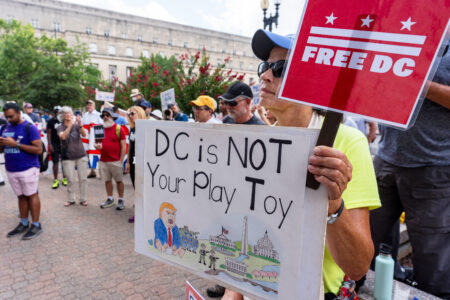Pa counties, school districts prepare for service cuts if a state budget isn’t delivered soon

Downtown Shamokin in Northumberland County. (Emily Previti/Pennsylvania Capital-Star)
Across Pennsylvania, counties and providers of essential human services are bracing for what many fear will be a protracted state budget standoff in Harrisburg that’s already nearly seven weeks past the deadline.
For many, it’s bringing up fears of another impasse like in 2015, when lawmakers went nine months without finalizing a spending plan.
While most Pennsylvanians won’t have noticed any change in their day-to-day lives so far, for some of the most vulnerable people in the state, that may soon change. That’s because, until a budget is signed by Gov. Josh Shapiro, state payments for county-run services — like child welfare enforcement, senior citizen care, county health department programming, and more — are effectively on hold.
So, county governments are beginning to dip into their reserves. Now, officials and the nonprofits they contract with are rushing to develop contingency plans for when those run dry.
According to reporting by Spotlight PA, more than $2.5 billion in state payments for education and human services will be delayed in the coming weeks if lawmakers don’t come to an agreement.
“We’re hearing somewhere around the middle of next month as being the time some counties may run out of those reserves,” said Kyle Kopko, executive director of the County Commissioners Association of Pennsylvania. “Some may be before that. Some may be after. There’s going to be a lot of these human services that they’re mandated to provide, and if that’s the case, county commissioners are going to have to start looking at where they can move that money around.”
For many counties, that will mean a temporary stop or reduction in some social services. For others, it could mean taking out loans against expected tax payments, which come with interest that won’t be covered by the state when a budget is eventually passed and signed into law.
“In October, if we get that far and there’s still not a state budget, there’s going to be some real financial pressures for counties,” Kopko said.
But some won’t be able to wait that long. While most have not had to disrupt services yet, the longer the budget stalemate drags out, the more likely that becomes. And for many county officials and service providers, the current impasse brings back memories of the longest in recent memory in 2015. It lasted nine months, and led to many cuts in services and loans that, in some cases, providers are still paying back.
For instance, the Pennsylvania Council of Children, Youth and Family Services represents agencies and nonprofits that contract with counties to provide child and family services. They help recruit foster families, get those families’ homes ready to take kids, staff group homes, and more. Collectively, they employ more than 12,000 people.
While some receive money from federal sources like Medicaid, President and CEO Terry Clark says about 90% are paid or reimbursed for their work by counties. As it stands, those counties may soon be unable to pay them.
“Some of those providers, they’re going to continue to work, regardless of whether the county or the state is paying them,” Clark said. “They have to. They have to be there for those kids and families.”
While most child service providers have not had to dip into reserves yet, it’s been a scramble to figure out what they’re going to do if the budget impasse drags out any longer. That may mean cutting their workforce, temporarily lowering pay, halting some services, or foregoing pay altogether until the stalemate in Harrisburg is resolved.
It could also lead to a situation that counties also face – taking out loans, with interest that won’t be covered by the state. Clark says some of the contractors he represents are still repaying loans taken out during the 2015 impasse. Back then, he says, more than 100 service providers had to borrow over $172 million.
“Some people, to get that loan, had to put up their personal property,” Clark said. “That’s pretty sad when you might have to have a nonprofit CEO take out a loan on their home and know that they’re never going to get reimbursed [for the interest].”
During that nine-month impasse, Clark was working on the government side, as a county administrator in York County. He remembers what it was like having to triage social services, figure out how they could shift around funds, and take out loans on the county side.
“The biggest lesson I learned is a lot of these nonprofits, they just don’t have a lot of money sitting there waiting,” he said. “They don’t have a slush fund or rainy day fund like the government has.”
Janine Maust is the executive director of Aging Services Inc., a private nonprofit that partners with Indiana County to provide services for seniors. They provide free meals for seniors, help them with bathing, provide in-home services for some who can’t travel, and offer an emergency button service in case of falls or other health issues.
Since the June 30 deadline for Pennsylvania to implement a budget, her organization has implemented a spending freeze. Except for covering operating costs, like keeping the lights on, and paying employees and providers, they’re unable to spend additional funds.
That has led to cutting back on social events they hold for seniors, or at least finding ways to hold events at little to no cost. It has also meant a growing waiting list for services. While the wait list began last April, it’s been growing and being exacerbated by the impasse.
“If we’re flat-funded, those waiting lists are going to continue,” Maust said. “We need money above what we’re allocated to take people off a waiting list.”
Already, Maust said her organization is dipping into reserves, and looking at the possibility of taking out a credit line, the interest on which they’ll be responsible for without state help. She expects it will be around two to three months until that becomes a necessity.
“Once the budget is passed and signed by the governor, it takes probably 45 to 60 days to get the money to come in,” Maust said. That could mean, even if a budget passed, they may still have to take a loan.
“We’ll have to pay interest on that, and we’ll have to use dollars to do that that could be spent on older adults,” she added.
According to Brian Bornman, executive director of the Pennsylvania Children and Youth Administrators Associations, some service providers that work with vulnerable kids and the families that care for them, are already seeing cuts to their pay,
“Generally what I’m hearing is some are already starting to provide reduced payments to providers,” Bornman said. “It may start that month one, they’re paying 80% of the invoice, and then 60%, and on down.”
Bornman says that’s in part that’s because, while lawmakers and their staff will continue to be paid as a standoff continues, counties will not receive state funds that are typically directed to providers of child welfare services and other mandatory, county-run programs.
“One can go down a cynical road there, if they were so inclined,” Bornman said.
However, he stressed, while some programs may be cut, when it comes to crucial services like child protective programs, work will continue, regardless of what happens in Harrisburg.
“If you have concerns that any child is being abused, continue to call as you normally would, because those services are going to be continued,” Bornman said. “The child welfare workforce is incredibly dedicated, and the counties are extremely committed to making sure the kids are protected.”
Following safety net services, schools will likely be the next to feel the squeeze. Though, for now, many are able to operate as usual.
The Pottstown School District is an example.
“The reality is school districts get a decent amount of funding from real estate tax revenues, which are all coming in right now, said Pottstown Superintendent Stephen Rodriguez, superintendent of the Pottstown School District. “Nevertheless, the short term effects are negligible. The long-term effects are detrimental. So we would like for there to be a budget.”
Matt Vannoy, the vice president of the Pennsylvania School Boards Association and a school board director for Sharon City School District, said in a public meeting last week that, while many school districts have enough funds to last for several months, some will have to take action as soon as next month.
Those districts, he said, may have to take out loans, with interest costs that will be passed to taxpayers, or delay purchases of things like textbooks, electronics, classroom supplies and other materials.
“Ultimately that trickles down,” he said of costs borne by school districts to offset a delay of state funds. “You’re hurting kids and you’re impacting your instructional programs.”
Vannoy said his own school district is “not in a terrible spot as of today,” and has enough funding to last for four or five months.
Spokespeople for Gov. Shapiro and House Majority Leader Matt Bradford (D-Montgomery) did not respond to requests for comment.
A spokesperson for Senate President Pro Tempore Kim Ward (R-Westmoreland) sent a statement.
“The Senate passed a responsible short-term budget that immediately released funding for schools, nursing homes and human services,” she said. “Gov. Shapiro and House Democrats blocked that deal. Any cuts in services to schools, nursing homes, hospitals, and essential services lies with Gov. Shapiro and House Democrats to answer as to why they are holding the funds hostage.”
While the Democratic-led House rejected a stop-gap budget passed by the Republican-controlled Senate earlier this month, the House also passed a budget bill in July, which stalled in the Senate.
Leaders of both parties have blamed the other for the impasse, while emphasizing negotiations continue.
Mass transit agencies across the commonwealth are also feeling the squeeze, with the Southeastern Pennsylvania Transportation Authority (SEPTA), the state’s largest transit authority, set to begin a 20% service cut later this month. They say deeper cuts will follow if the state does not increase their funding.
Other transit agencies in urban, rural and suburban areas have said they would have to cut services as well if a budget with increased funding isn’t agreed to soon.
——
Pennsylvania Capital-Star is part of States Newsroom, a network of news bureaus supported by grants and a coalition of donors as a 501c(3) public charity. Pennsylvania Capital-Star maintains editorial independence. Contact Editor Tim Lambert for questions: info@penncapital-star.com. Follow Pennsylvania Capital-Star on Facebook and Twitter.






